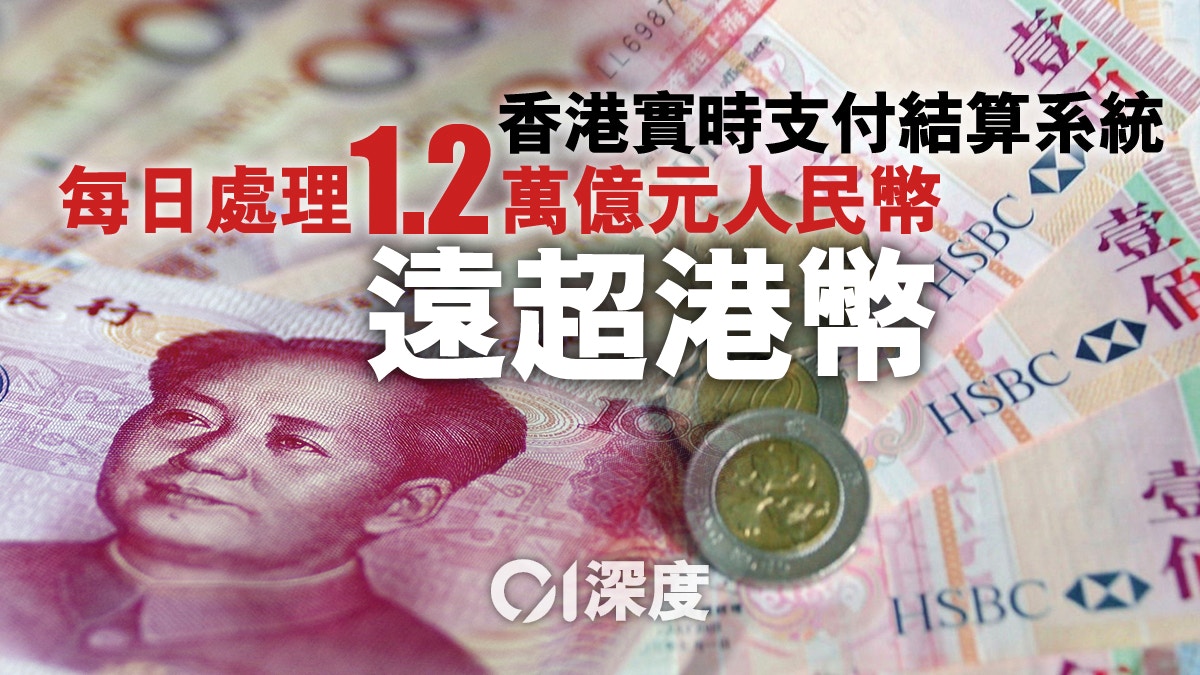Hong Kong's finance is ushering in new development opportunities.
The "National Fourteenth Five-Year Plan" determined the status of Hong Kong as an "offshore RMB hub." When national experts went south to preach the "14th Five-Year Plan", they also repeatedly emphasized that Hong Kong should actively contribute to the internationalization of the RMB. The "Hong Kong Modern Service Industry Cooperation Zone Reform and Opening Plan" further encourages interconnection with Hong Kong's financial market to achieve cross-border RMB innovation, and later the "Guangdong-Hong Kong-Macao Greater Bay Area Cross-border Wealth Management" pilot rules have been announced successively.
"This shows that the Mainland is advancing the internationalization of the RMB in an orderly manner." When the
author and financial scholar Ba Qing of "The Key to Internationalization of the RMB: Promoting the Establishment of an Offshore Market Mechanism" (hereinafter referred to as "the key") was interviewed by "Hong Kong 01" earlier Commented, "In this process, Hong Kong is still the most ideal overseas platform to promote financial opening and the internationalization of the RMB."
On August 23, Huang Liuquan, Deputy Director of the Hong Kong and Macau Affairs Office of the State Council of the People’s Republic of China, led a delegation to the government headquarters and the Legislative Council to explain the "14th Five-Year Plan Outline" to government officials and parliamentarians (Hong Kong 01)
Looking at the
offshore RMB market in Hong Kong from
another angle
In 2009, as the country launched a pilot program for cross-border trade settlement, RMB internationalization officially "started" in Hong Kong.
Subsequently, the internationalization of the renminbi experienced a "high mountain" of rapid growth, and it also fell into a "trough" of reform and adjustment.
Especially after the "8.11 exchange rate reform" in 2015, expectations of RMB depreciation have intensified, and the central bank has tightened the outflow of RMB, which has "halved" Hong Kong's offshore RMB (CNH) deposits from the peak of one trillion to 500 billion.
Looking back on the ten-year development cycle, there have been many discussions in the academic circle about the future of RMB internationalization and the role of Hong Kong. For example, "Hong Kong is no longer the only window for the RMB to go global" and "Onshore local market opening is what promotes the internationalization of the RMB. Main motivation".
It is true that in the past, when observing the difference between the onshore and offshore markets in the process of RMB internationalization, the focus is on the "exchange rate": the onshore price of RMB is mainly dominated by the Central Bank of China, while the offshore price is determined by market supply and demand.
However, Ba Qing's book "The Key" expresses different views. She believes that as the country initiates exchange rate reforms, the onshore market is gradually opened up and interconnection is strengthened, and the difference between onshore and offshore RMB prices is also getting closer. narrow.
"Now the difference between the two exchange rates is about 100 basis points." She later said in an interview with "Hong Kong 01", "There will be no such thing as "two markets, two exchange rates" before."
The onshore market and the offshore market will not appear as if there were "two markets, two exchange rates" in the past.
(Getty Images)
In the new stage of RMB internationalization, the perspective of distinguishing between onshore and offshore markets should be updated according to the trend.
"If the offshore fund pool reaches ten trillion yuan, but it is only used as a deposit "lay there", there is no place to use it, and the offshore market will not be developed." Ba Qing pointed out that it should look at the corresponding product indicators, such as "foreign exchange , Bond issuance, and derivatives trading. The market depth and breadth continue to expand. This is the "healthy" indicator for measuring the development of the offshore market.
"Don't just look at the "stock" indicator, you can look at the "flow" more." Ba Qing gave an example, "In terms of stock, the offshore fund pool has rebounded. It is not a rapid growth, but a stable growth that can support a larger flow. "According to the Hong Kong Monetary Authority, Hong Kong’s offshore RMB deposits of approximately 820 billion yuan in July 2021 "have returned to a relatively normal state."
From a traffic perspective, the scale of RMB settlement in Hong Kong’s Real Time Gross Settlement (RTGS) system "always remains at a high level." In 2020, the average daily settlement volume exceeded RMB 1.19 trillion, which has exceeded that in the RTGS system. The daily settlement volume in Hong Kong dollars.
According to a survey conducted by the Bank for International Settlements, the daily turnover of RMB foreign exchange transactions and over-the-counter interest rate derivatives in Hong Kong in 2019 reached US$120 billion, an increase of 45% over 2016.
"It should be noted that the balance of RMB in Hong Kong's banking system during the same period has not increased significantly." Ba Qing emphasized, "In other words, the frequency of offshore RMB financial activities supported by Hong Kong and the efficiency of fund use have increased. Hong Kong is ensuring the stability of the fund pool. Under the circumstances, it can support many offshore activities.”
Hong Kong has been able to support many offshore activities while ensuring the stability of its fund pool.
(Visual China)
The renminbi's obvious "investment" characteristics
should make good use of its phased characteristics
Regarding offshore activities and products, we have to mention offshore RMB bonds (dim sum bonds).
Dim sum debt is the "first step" in the internationalization of RMB in offshore investment products, and it is also an important way for the offshore market to broaden and deepen the RMB product pool.
However, the dim sum bond market in Hong Kong has shrunk in recent years. According to the "Hong Kong and Singapore Bond Market" by the Legislative Council Secretariat, between 2014 and 2019, the number of dim sum bond issuances decreased from 149 to 42, and newly listed dim sum bonds The number of bonds also dropped from 83 to 16.
(The following figure)
In an earlier interview, Ba Qing emphasized that the main reason for the shrinkage of the dim sum bond market in Hong Kong is the "low interest rate" of the US dollar.
She gave an example that the current issuance amount of "Panda bonds" (onshore RMB bonds issued by overseas institutions) is not much different from the outstanding amount of "Dim Sum bonds", indicating that "the issuance of RMB-denominated bonds is mainly affected by the level of interest rates." "Now that the global dollar and euro are low interest rates, market entities will spontaneously choose currencies with low bond issuance costs to issue bonds."
"At this stage, the interest rate differential between China and the United States determines that the renminbi may be used more as an "investment currency"." Ba Qing said, "The level of renminbi interest rates is high, and everyone likes to invest in it, such as buying renminbi government bonds." International Monetary Fund According to the data released by the "Official Foreign Exchange Reserve Currency Composition", this year's total global RMB foreign exchange reserves achieved 9 consecutive quarters of growth, rising to 287.46 billion U.S. dollars.
The renminbi's share of global foreign exchange also rose to 2.45%, a record high.
The interest rate difference between China and the United States determines that the renminbi may be used more as an "investment currency" at present.
(Profile picture)
The investment demand for RMB is strong, and Hong Kong's financial sector has deepened its exploration of the stage characteristics that can be used.
Ba Qing suggested in "Key" to establish a RMB bond repurchase (Bond Repo) mechanism and develop the bond repurchase market.
The Repo function is a basic method of obtaining liquidity. "For example, investors holding Federal Reserve government bonds can be mortgaged to other institutions to obtain financing. The RMB government bonds held by overseas institutions also need a corresponding mechanism to support repurchase to obtain RMB liquidity. She analyzed that this is also a means to improve the efficiency of the use of renminbi assets. "Investors invest in renminbi-denominated bonds not only for holding purposes, but more uses can increase everyone’s willingness to hold renminbi bonds."
"In the future, the operating mechanism and functions of the offshore RMB market in Hong Kong will be further strengthened and consolidated." Ba Qing said, "With the recent implementation of a series of important measures, such as the "Qianhai Plan", "Hengqin Plan", Cross-border financial management, etc., the offshore market will usher in new development opportunities in product categories, participating groups, financial infrastructure and capital flows."
Finance scholar Ba Qing authored the book "The Key to RMB Internationalization: Promoting the Establishment of an Offshore Market Mechanism" and has many years of experience in researching "RMB Internationalization".
(Gong Jiasheng/photo)




/cloudfront-eu-central-1.images.arcpublishing.com/prisa/3I74UEXLYRBBRPGPSGWNN6WXH4.jpg)









